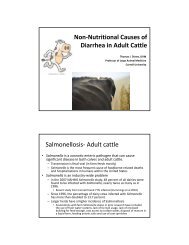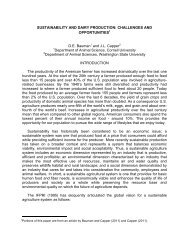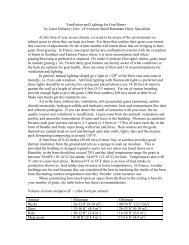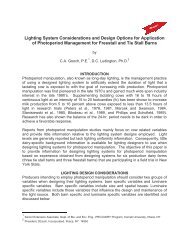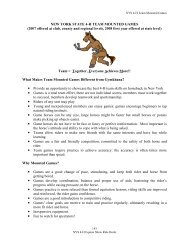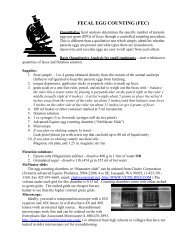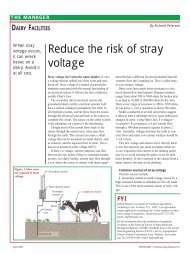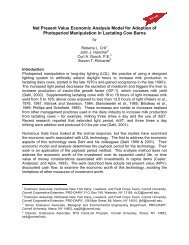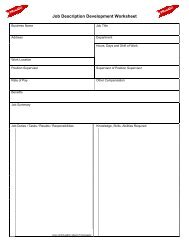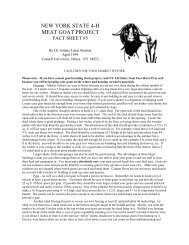pro-dairy - Department of Animal Science - Cornell University
pro-dairy - Department of Animal Science - Cornell University
pro-dairy - Department of Animal Science - Cornell University
- No tags were found...
You also want an ePaper? Increase the reach of your titles
YUMPU automatically turns print PDFs into web optimized ePapers that Google loves.
PRO-DAIRY<br />
Annual Report<br />
2007 – 2008<br />
Results<br />
Driven<br />
PRO-DAIRY
PRO-DAIRY<br />
Results<br />
Driven<br />
The PRO-DAIRY Mission<br />
Increase the <strong>pro</strong>fitability and competitiveness <strong>of</strong><br />
New York’s <strong>dairy</strong> businesses through<br />
industry-applied research and educational <strong>pro</strong>grams<br />
that enhance farm <strong>pro</strong>fitability while advancing <strong>dairy</strong><br />
<strong>pro</strong>fessionals’ knowledge, skills and enthusiasm.<br />
For 20 years PRO-DAIRY has dedicated itself to one goal: to<br />
<strong>pro</strong>vide <strong>pro</strong>gramming and leadership to the New York State<br />
<strong>dairy</strong> industry so it can continue to be a leader in the U.S. <strong>dairy</strong><br />
marketplace. Through results-driven education and research,<br />
PRO-DAIRY specialists have contributed to the technical<br />
knowledge, management skills and economic strength <strong>of</strong> New<br />
York’s <strong>dairy</strong> industry since 1988.<br />
The 2007-2008 PRO-DAIRY Annual Report focuses on two<br />
<strong>of</strong> the many highly successful and results-driven PRO-DAIRY<br />
<strong>pro</strong>grams: Business-focused discussion groups and the Junior<br />
DAIRY LEADER <strong>pro</strong>gram. While these <strong>pro</strong>grams serve diverse<br />
audiences, they share the common purpose <strong>of</strong> building and<br />
maintaining viable <strong>dairy</strong> businesses.<br />
This year’s PRO-DAIRY Annual Report will also highlight other<br />
<strong>pro</strong>gram areas vital to a strong <strong>dairy</strong> industry. They include<br />
environmental stewardship; community relations; crop,<br />
manure and nutrient management; herd health, nutrition and<br />
management; cow comfort and facilities; and <strong>dairy</strong> replacements.<br />
The later was the focus <strong>of</strong> the highly successful 2007-08 Winter<br />
Dairy Management School.<br />
David Galton<br />
Director<br />
PRO-DAIRY<br />
Thomas Overton<br />
Associate Director<br />
PRO-DAIRY
The New York Center for Dairy Excellence<br />
was founded to <strong>pro</strong>mote collaboration<br />
within the <strong>dairy</strong> industry to identify<br />
<strong>pro</strong>grams that address barriers to <strong>dairy</strong><br />
operations, as well as advance<br />
opportunities for success. We are very<br />
excited about working with PRO–DAIRY on<br />
two <strong>of</strong> our initially funded <strong>pro</strong>grams: the<br />
manure management technology<br />
initiative spearheaded by Tim Shepherd<br />
and the farmer <strong>pro</strong>fit–focused discussion<br />
groups led by Kathy Barrett. The strength<br />
<strong>of</strong> PRO–DAIRY’s reputation enabled these<br />
<strong>pro</strong>grams to attract highly qualified and<br />
motivated individuals, which is critical to<br />
the success <strong>of</strong> these endeavors.<br />
Mark Kenville<br />
Director, the New York Center for<br />
Dairy Excellence<br />
Syracuse, NY<br />
Collaboration<br />
for Success<br />
PRO–DAIRY is synonymous with collaboration,<br />
working cooperatively across the <strong>dairy</strong> industry<br />
to accomplish its mission. PRO–DAIRY is a<br />
joint venture <strong>of</strong> the New York State <strong>Department</strong><br />
<strong>of</strong> Agriculture and Markets and <strong>Cornell</strong><br />
<strong>University</strong>’s College <strong>of</strong> Agriculture and Life<br />
<strong>Science</strong>s. PRO–DAIRY thanks these partners<br />
for their support and the state <strong>of</strong> New York<br />
for its fi nancial contribution.<br />
A new PRO–DAIRY partner is the Center for<br />
Dairy Excellence, established by the New York<br />
Farm Viability Institute. Through the Center’s<br />
grassroots structure, <strong>dairy</strong> <strong>pro</strong>ducers and<br />
stakeholders prioritize applied research and<br />
demonstration <strong>pro</strong>jects to fund. Collaboration<br />
between the Center and PRO–DAIRY resulted<br />
in the Pr<strong>of</strong>i t Discussion Groups initiative,<br />
highlighted in this year’s Annual Report.<br />
Other collaborators include <strong>dairy</strong> <strong>pro</strong>ducer<br />
groups, <strong>Cornell</strong> Cooperative Extension, and<br />
numerous agribusinesses and state<br />
government agencies. (For a complete list,<br />
see inside back cover)<br />
The 2007–2008 PRO–DAIRY annual report<br />
refl ects the scope <strong>of</strong> the <strong>pro</strong>gram’s work to<br />
keep New York’s <strong>dairy</strong> industry competitive and<br />
<strong>pro</strong>fi table.<br />
David Galton<br />
Director<br />
PRO–DAIRY<br />
In times <strong>of</strong> increased costs and tight<br />
<strong>pro</strong>fit margins, PRO–DAIRY is there for<br />
our <strong>dairy</strong> <strong>pro</strong>ducers. The skilled staff,<br />
discussion groups, and numerous<br />
<strong>pro</strong>grams and services PRO–DAIRY<br />
<strong>of</strong>fers the industry help ensure that<br />
New York <strong>dairy</strong> farmers remain competitive<br />
and viable. The <strong>Department</strong> is<br />
highly committed to supporting<br />
PRO–DAIRY, as it is an essential<br />
resource in growing this industry.<br />
Patrick Hooker<br />
Commissioner, New York State<br />
<strong>Department</strong> <strong>of</strong> Agriculture<br />
and Markets<br />
Thomas Overton<br />
Associate Director<br />
PRO–DAIRY<br />
Results<br />
Driven<br />
New York Dairy Industry<br />
5,820 dairies<br />
3 rd nationally in milk<br />
<strong>pro</strong>duction<br />
12.1 billion pounds <strong>of</strong> milk<br />
<strong>pro</strong>duced annually<br />
$2.4 billion (est.) in farm<br />
gate milk revenue annually<br />
PRO-DAIRY<br />
1
Business discussion groups<br />
bolster farmers’ financial and<br />
<strong>pro</strong>duction performance<br />
PRO–DAIRY supports<br />
business–focused <strong>dairy</strong><br />
farm discussion groups<br />
across New York State. It<br />
also <strong>pro</strong>vides leadership<br />
to these groups, which<br />
assist <strong>dairy</strong> farmers in<br />
their efforts to im<strong>pro</strong>ve<br />
their businesses’<br />
financial and <strong>pro</strong>duction<br />
performance<br />
As word <strong>of</strong> the success <strong>of</strong> these groups has<br />
spread, more business discussion groups<br />
have formed. In 2007, 69 dairies participated in<br />
business discussion groups. They vary across the<br />
state, but generally the groups are small–six to 20<br />
farmers that meet one to three times a year.<br />
<strong>Cornell</strong> Cooperative Extension business<br />
management educators, along with PRO–DAIRY<br />
specialists, generally facilitate the discussion<br />
groups. PRO–DAIRY’s Jason Karszes, business<br />
management specialist and key facilitator <strong>of</strong> the<br />
Dairy Farm Business Summary (DFBS) <strong>pro</strong>gram,<br />
<strong>of</strong>ten participates in meetings. It’s a perfect fi t<br />
since the DFBS is <strong>of</strong>ten the foundation for group<br />
discussions.<br />
Discussion groups give <strong>dairy</strong> farmers the<br />
opportunity to test and exchange ideas with<br />
people who share their interests and who face,<br />
and solve, similar challenges. Specifi cally,<br />
discussion groups allow <strong>pro</strong>ducers to:<br />
Hear from others what they do to<br />
generate their performance results.<br />
Develop a network <strong>of</strong> <strong>pro</strong>ducers who<br />
serve as sounding boards outside <strong>of</strong><br />
discussion group meetings.<br />
DISCUSSION GROUPS IN ACTION<br />
Nine business discussion groups, representing<br />
69 New York State dairies, met in 2007. Here’s a<br />
snapshot <strong>of</strong> a few <strong>of</strong> these groups.<br />
LEWIS COUNTY<br />
Dairy Managers Discussion Group<br />
Nine dairies, two veterinarians and two<br />
<strong>Cornell</strong> Cooperative Extension educators<br />
participate in the eight–year–old group.<br />
The standard for membership in the Dairy<br />
Managers Discussion Group is simple:<br />
Producers must have a desire to im<strong>pro</strong>ve as<br />
<strong>dairy</strong> <strong>pro</strong>fessionals. The Dairy Farm Business<br />
Summary (DFBS), one <strong>of</strong> the tools the group<br />
uses, is the basis for discussions <strong>of</strong> fi nancial<br />
and <strong>pro</strong>duction parameters every year.<br />
The group’s mission statement says it all: The<br />
Dairy Managers Discussion Group exists to<br />
create opportunities for the open and honest<br />
exchange <strong>of</strong> ideas and information with a small<br />
group <strong>of</strong> <strong>dairy</strong> industry <strong>pro</strong>fessionals, whose<br />
members share the desire to achieve higher<br />
levels <strong>of</strong> success and expertise. Our members<br />
seek to be on the forefront <strong>of</strong> the knowledge,<br />
skills and ideas that affect our <strong>pro</strong>fessional<br />
lives and strive to be <strong>pro</strong>active in dealing with<br />
common challenges within our <strong>dairy</strong> industry.<br />
Compare actual fi nancial and <strong>pro</strong>duction<br />
performance with similar dairies and to<br />
industry benchmarks.<br />
Discuss the impacts <strong>of</strong> management<br />
practices and changes on performance<br />
measures.<br />
These discussions are tremendously<br />
motivating and have led members to<br />
implement new practices that have<br />
positively impacted their businesses.<br />
2<br />
Frans Vokey<br />
Lewis County <strong>Cornell</strong> Cooperative<br />
Extension educator<br />
PRO-DAIRY<br />
Results<br />
Driven<br />
Members <strong>of</strong> the Dairy Managers<br />
Discussion Group learned about group<br />
calf feeding <strong>of</strong> acidifi ed milk replacer<br />
from a speaker at one meeting. Glenn<br />
Beller’s <strong>dairy</strong> was one <strong>of</strong> three in the<br />
group to implement the practice. The<br />
Carthage <strong>dairy</strong> <strong>pro</strong>ducer benefi ts from<br />
the group’s willingness to delve into<br />
how dairies achieve their fi nancial and<br />
<strong>pro</strong>duction numbers.
RENSSELAER COUNTY<br />
Cathy Wickswat, farm business management<br />
Extension educator in Rensselaer County,<br />
spearheads three discussion groups.<br />
Results<br />
Driven<br />
Farm net worth ~ $6 million ~ $16 million other ways to im<strong>pro</strong>ve <strong>pro</strong>fi tability. The dairies<br />
Five Farm Group<br />
This group began in 1994 with two dairies<br />
and has grown to fi ve dairies in four counties.<br />
Some 13 family members <strong>of</strong> all ages attend<br />
Group members have helped each other with:<br />
Expansion plans: Provided advice on<br />
what to build and where to build.<br />
Manure handling: Helped with decision–<br />
making on building manure storage.<br />
group meetings. The <strong>Cornell</strong> DFBS is key to<br />
Milk marketing: Two dairies now market<br />
discussions <strong>of</strong> the Five Farm Group. Like many<br />
their milk together.<br />
<strong>of</strong> the groups across the state, this one holds<br />
a day–long meeting early in the year to discuss<br />
members’ DFBS results. Each <strong>dairy</strong> hosts a<br />
tour <strong>of</strong> its farm, and the group has toured dairies<br />
elsewhere in the state.<br />
Feed costs: By talking about input<br />
costs, members learn about feed<br />
options and ways to cut costs.<br />
Cropping: The group helped one <strong>dairy</strong><br />
increase corn silage yields by 30% and<br />
These statistics from the Five Farm Group<br />
speak volumes about the positive impact for<br />
dairies in the group:<br />
hay yield by 20% through discussions<br />
on crop rotation, soil testing, timely<br />
planting and equipment changes to<br />
1994 2007<br />
lessen soil compaction.<br />
Veterinarian and medical costs: The<br />
Cow numbers 1,029 2,524<br />
group encouraged one <strong>dairy</strong> with high<br />
veterinarian and medical costs<br />
Total pounds <strong>of</strong><br />
milk <strong>pro</strong>duced ~ 23 million ~ 62 million<br />
to change management practices.<br />
Using techniques from the other dairies,<br />
Corn silage yield 15.5 21.2<br />
this business saved $16,268 in this area<br />
Rate <strong>of</strong> return on all<br />
capital, with appreciation 5.31% 20.49%<br />
in 2007.<br />
(The Northern Hudson DFBS average rate <strong>of</strong> return<br />
on all capital with apreciation was 3.71% in 1994 and<br />
Three Farm Discussion Group<br />
an estimated 14.99% in 2007)<br />
The six members <strong>of</strong> this group, which began<br />
range in size from 52 to 125 cows. Two herds<br />
have conventional stall barns and one a<br />
freestall barn.<br />
For several years our farm has been<br />
part <strong>of</strong> a discussion group. We, along<br />
with two other farmers compare figures<br />
and accomplishments. We discuss<br />
many things and teach one another<br />
our experiences. It has been very<br />
helpful in our operation, and we would<br />
recommend it very much.<br />
Results<br />
Driven<br />
When the group compared milk<br />
prices, one <strong>dairy</strong> learned its Producer<br />
Price Differential, minus hauling plus<br />
market premiums, was 70 cents per<br />
hundredweight below the other dairies.<br />
That meant $7,000 less in the <strong>dairy</strong>’s<br />
milk check compared to the other<br />
dairies. Armed with this information, the<br />
<strong>dairy</strong> <strong>pro</strong>ducer negotiated a better milk<br />
price – and increased its <strong>pro</strong>fi tability by<br />
$25,000 to $30,000.<br />
Seymour VanderVeen<br />
Seven View Farm, Delanson, NY<br />
PRO-DAIRY<br />
3
CHAUTAUQUA & CATTARAUGUS<br />
COUNTIES<br />
When <strong>dairy</strong> <strong>pro</strong>ducers who rotationally<br />
graze their herds asked to meet with other<br />
grazers to discuss <strong>pro</strong>fi table practices, a<br />
two–county <strong>Cornell</strong> Cooperative Extension<br />
team responded. They began the Advanced<br />
Dairy Grazing Discussion Group, and in 2006<br />
representatives <strong>of</strong> 13 dairies met six times.<br />
Working with PRO–DAIRY specialists to<br />
develop customized report formats, Extension<br />
educators used the DFBS as the centerpiece<br />
<strong>of</strong> the discussion group’s fi rst meeting.<br />
Subsequently, the group did on–farm pasture<br />
walks to talk about grass clipping, summer<br />
seedings, feeding <strong>pro</strong>grams and many other<br />
topics to help member dairies im<strong>pro</strong>ve their<br />
fi nancial and <strong>pro</strong>duction performance.<br />
Discussion groups are a powerful tool. To<br />
be successful, there must be “chemistry”<br />
within the group. Their personalities and<br />
ability to maintain confidentiality is very<br />
important. A discussion group is like<br />
having an extended consultant for the<br />
business.<br />
Cathy Wickswat<br />
<strong>Cornell</strong> Cooperative Extension,<br />
Rensselaer County<br />
By comparing themselves to similar<br />
dairies in the same area, participants <strong>of</strong><br />
the Advanced Dairy Grazing Discussion<br />
Group have a realistic way to benchmark<br />
their businesses against others.<br />
David Munsee<br />
Farm business management educator,<br />
Chautauqua County, NY<br />
4<br />
PRO-DAIRY
Dairy business<br />
discussion<br />
group <strong>pro</strong>gram<br />
expands<br />
Working collaboratively, PRO–DAIRY and<br />
the Center for Dairy Excellence hired Kathy<br />
Barrett to spread the business discussion<br />
group format across the state. The Pr<strong>of</strong>i t<br />
Discussion Group <strong>pro</strong>gram will make available<br />
to all dairies the benefi ts <strong>of</strong> shared ideas and<br />
experiences enjoyed by farmers in Lewis,<br />
Rensselaer, Chautauqua, Cattaraugus and<br />
other counties. It’s a <strong>pro</strong>ven method to help<br />
dairies discover farmer–tested ways to impact<br />
business <strong>pro</strong>fi tability.<br />
The <strong>pro</strong>gram’s ambitious goal is to form<br />
20 discussion groups by 2009. Groups<br />
will represent the diversity <strong>of</strong> New York’s<br />
<strong>dairy</strong> industry in geography and <strong>pro</strong>duction<br />
management systems. Each group will have a<br />
targeted membership.<br />
Agribusiness <strong>pro</strong>fessionals and Extension<br />
educators, acting as coordinators and<br />
facilitators, will play important roles in the<br />
Pr<strong>of</strong>i t Discussion Groups.<br />
The business discussion group <strong>pro</strong>vides<br />
a nice opportunity to interact with other<br />
<strong>pro</strong>gressive farmers who have a positive<br />
attitude and outlook on agriculture. One<br />
<strong>of</strong> the biggest advantages <strong>of</strong> the group<br />
is sharing ideas in a rapidly changing<br />
environment. It opens up new ideas and<br />
strategies and <strong>pro</strong>vides an outlook for<br />
moving forward.<br />
Discussion groups make the Dairy Farm<br />
Business Summary more useful and<br />
<strong>pro</strong>vide the opportunity to understand why<br />
the numbers are different across dairies.<br />
When you look at the numbers on your<br />
own, you can use them to set goals, but<br />
it doesn’t show how different farms are<br />
able to achieve levels <strong>of</strong> performance in<br />
certain areas.<br />
Specifically, because <strong>of</strong> what we learned<br />
in the discussion group, we made changes<br />
to our dry–cow <strong>pro</strong>gram in the way we<br />
ap<strong>pro</strong>ach their handling and care.<br />
Kitty Dziedzic<br />
Dairy Producer<br />
Bliss, NY<br />
PRO-DAIRY<br />
5
Junior DAIRY LEADER Program<br />
builds enthusiasm for careers<br />
in <strong>dairy</strong>ing<br />
Since 1999, the Junior<br />
DAIRY LEADER <strong>pro</strong>gram,<br />
a PRO–DAIRY initiative,<br />
has introduced 163 young<br />
people to the multitude <strong>of</strong><br />
exciting opportunities in<br />
the <strong>dairy</strong> industry<br />
During the year–long Junior DAIRY LEADER<br />
<strong>pro</strong>gram, 15 to 19 year olds from across New<br />
York State:<br />
Prepare for successful careers in the<br />
<strong>dairy</strong> industry.<br />
Gain a deep understanding <strong>of</strong> the <strong>dairy</strong><br />
industry’s vibrancy.<br />
Are exposed to <strong>pro</strong>gressive and<br />
<strong>pro</strong>fi table agricultural businesses.<br />
Learn communication and teamwork<br />
skills that aid in <strong>pro</strong>blem solving.<br />
Explore and enhance their career<br />
planning through discussions with <strong>dairy</strong><br />
industry leaders and <strong>pro</strong>fessionals.<br />
Develop personal, <strong>pro</strong>fessional and<br />
leadership skills necessary to make<br />
positive contributions to the <strong>dairy</strong><br />
industry.<br />
The Junior DAIRY LEADER <strong>pro</strong>gram run by<br />
Deborah Grusenmeyer <strong>pro</strong>vides a strong<br />
foundation for the start <strong>of</strong> our youth’s<br />
<strong>dairy</strong> careers. This <strong>pro</strong>gram is especially<br />
important in developing young people’s<br />
interests in the <strong>dairy</strong> industry by <strong>pro</strong>viding<br />
a fun and educational atmosphere.<br />
Jonathan Lamb, Dairy Producer<br />
Chairman, Northeast Dairy<br />
Producers Association<br />
Oakfield, NY<br />
Obtain work experience in the <strong>dairy</strong><br />
fi eld.<br />
Develop technical skills through training<br />
workshops. For example, a two–day<br />
workshop in <strong>dairy</strong> re<strong>pro</strong>duction, done<br />
in collaboration with GENEX/CRI,<br />
introduces Junior DAIRY LEADERS to<br />
re<strong>pro</strong>duction management and artifi cial<br />
insemination skills.<br />
Develop resumes, working with <strong>Cornell</strong><br />
<strong>University</strong>’s Career Center.<br />
Junior DAIRY LEADERS attend regional and<br />
national meetings, including the National 4–H<br />
Dairy Conference and World Dairy Expo in<br />
Wisconsin. They meet with more than 200<br />
young people from across the United States<br />
and Canada with similar interests and begin<br />
to build an extensive network in the <strong>dairy</strong><br />
industry. Tours <strong>of</strong> dairies and agri–businesses<br />
in Wisconsin help young people to learn about<br />
the industry’s infrastructure and global aspects.<br />
In the Northeast, Junior DAIRY LEADERS tour<br />
dairies and agribusinesses as part <strong>of</strong> the year–<br />
long <strong>pro</strong>gram. On dairies, they see everything<br />
from robotic milkers to worms composting<br />
manure, organic <strong>dairy</strong>ing and freestall/parlor<br />
systems. Through these tours, young people<br />
see fi rsthand the range <strong>of</strong> successful <strong>dairy</strong><br />
management styles and ap<strong>pro</strong>aches. The<br />
young people conduct on–farm <strong>pro</strong>duction<br />
analysis and <strong>pro</strong>blem solving.<br />
Among the agribusinesses the group visits is<br />
the Cargill <strong>Animal</strong> Nutrition Plant in Syracuse.<br />
There they learn about the feed industry<br />
infrastructure and technology, as well as<br />
career opportunities and education required<br />
for those jobs. On a visit to Dehm Associates,<br />
in Geneseo, the young people participate in a<br />
mock farm advisory team meeting. At the same<br />
session, Farm Service Agency staff talks about<br />
careers in the fi nancial management area.<br />
Through visits to agribusinesses, young people<br />
interact with <strong>pro</strong>fessionals who have positive and<br />
enthusiastic attitudes about the <strong>dairy</strong> industry<br />
and the opportunities it <strong>of</strong>fers young people.<br />
6<br />
PRO-DAIRY
Results<br />
Driven<br />
97% <strong>of</strong> the 163 Junior DAIRY LEADER<br />
graduates continue their education<br />
beyond high school.<br />
85% <strong>of</strong> that group are attending, or<br />
will attend, the SUNY Agriculture and<br />
Technology colleges or <strong>Cornell</strong><br />
<strong>University</strong> in the <strong>dairy</strong> science fi eld.<br />
Importantly, 40% <strong>of</strong> these youth<br />
indicated they were not planning<br />
to pursue agricultural careers prior<br />
to participating in the Junior DAIRY<br />
LEADER Program.<br />
10% are pursuing careers in education.<br />
Three Junior DAIRY LEADER graduates<br />
directly entered <strong>dairy</strong> <strong>pro</strong>duction and<br />
agribusiness careers.<br />
The Junior DAIRY LEADER <strong>pro</strong>gram<br />
opened my eyes to the variety <strong>of</strong> career<br />
opportunities within the <strong>dairy</strong> industry.<br />
It made me more certain that I wanted<br />
to focus on <strong>dairy</strong> and agribusiness in<br />
college. I networked with several people<br />
within the <strong>dairy</strong> industry, some <strong>of</strong> whom I<br />
may work with in the future.<br />
Betsey Howland, Candor, NY<br />
<strong>Cornell</strong> <strong>University</strong> animal<br />
science major<br />
DAIRY LEADER class <strong>of</strong> 2005<br />
These organizations sponsor the Junior DAIRY<br />
LEADER <strong>pro</strong>gram: PRO–DAIRY, Agway<br />
Foundation, New York Farm Viability Institute,<br />
Northeast Farm Credit AgEnhancement<br />
<strong>pro</strong>gram, Cargill <strong>Animal</strong> Nutrition, Genex/CRI,<br />
SHUR–GAIN USA and Dehm Associates.<br />
In late 2006, the New York Farm Viability<br />
Institute awarded the Junior DAIRY LEADER<br />
<strong>pro</strong>gram an $88,000 grant for two years <strong>of</strong><br />
<strong>pro</strong>gramming. The grant will also be used to<br />
document the relationship between<br />
completing the <strong>pro</strong>gram and attending college<br />
and fi nding jobs on dairies or in agribusiness.<br />
PRO-DAIRY<br />
7
Young people discover<br />
<strong>dairy</strong>ing at weekend<br />
workshop<br />
Dairy Discovery, a statewide <strong>pro</strong>gram for 15<br />
to 19 year olds, is a hands–on workshop held<br />
annually at <strong>Cornell</strong> <strong>University</strong>. Young people<br />
spend a day and a half on campus learning<br />
about <strong>dairy</strong> careers and rotating through<br />
a series <strong>of</strong> hands–on stations focused on<br />
specifi c aspects <strong>of</strong> the <strong>dairy</strong> fi eld.<br />
The focus for Dairy Discovery changes<br />
annually: In 2007, it was Maximizing the<br />
Feed Management Program. In previous<br />
years, Dairy Discovery focused on Dairy Herd<br />
Health and Management, Calf and Heifer<br />
Production Management, Quality Milk and<br />
Milk Production and Whole Farm Management<br />
Planning.<br />
The kids learn from Dairy Discovery’s<br />
hands–on ap<strong>pro</strong>ach. The applied learning<br />
that takes place gives them ideas they<br />
can take back to their home dairies. It’s<br />
an opportunity for these young people<br />
to come to <strong>Cornell</strong> and learn more about<br />
the <strong>dairy</strong> industry, <strong>dairy</strong> careers and<br />
opportunities available to them. It’s all<br />
about connecting young people to other<br />
young people and to <strong>pro</strong>fessionals.<br />
Deborah Grusenmeyer<br />
Coordinator, Dairy Discovery<br />
Young people <strong>pro</strong>be into the specifi cs <strong>of</strong><br />
<strong>dairy</strong> <strong>pro</strong>duction. For example, during the<br />
Dairy Discovery <strong>pro</strong>gram on Calf and Heifer<br />
Production Management, young people<br />
observed and participated in technical skill<br />
training related to such topics as <strong>pro</strong>per<br />
calving <strong>pro</strong>cedures and techniques, colostrum<br />
management and heifer <strong>pro</strong>gram analysis.<br />
In the 2007 Dairy Discovery workshop on<br />
Maximizing the Feed Management Program,<br />
ap<strong>pro</strong>ximately 70 young people participate<br />
in a hands–on experience with nutrition<br />
management including the role <strong>of</strong> total mixed<br />
rations in milk <strong>pro</strong>duction and cow health.<br />
Dairy Discovery is not only a perfect<br />
opportunity for young people to learn the<br />
basics <strong>of</strong> <strong>dairy</strong> management, but they have a<br />
campus experience. Instructors for the various<br />
hands–on experiences are <strong>of</strong>ten animal<br />
science <strong>pro</strong>fessors or graduate students.<br />
The success <strong>of</strong> Dairy Discovery is captured<br />
in these remarks from young people who<br />
participated in the 2007 event:<br />
There is so much out there in the <strong>dairy</strong><br />
world that I had no idea existed. The<br />
hands–on learning was great.<br />
I thought the <strong>pro</strong>gram was well<br />
rounded, and I learned a lot.<br />
Thank you so much for a great couple<br />
<strong>of</strong> days. It was a great experience.<br />
What a learning experience! I wish I had<br />
come before this year!<br />
8<br />
PRO-DAIRY
Environmental Stewardship and<br />
Education<br />
Environmental Education<br />
PRO–DAIRY specialists cultivate a strong<br />
partnership with researchers, <strong>dairy</strong><br />
environmental planners and advisers, and<br />
state and federal agencies in the areas <strong>of</strong><br />
nutrient management and Concentrated<br />
<strong>Animal</strong> Feeding Operation (CAFO) issues.<br />
As part <strong>of</strong> that partnership PRO–DAIRY staff<br />
<strong>pro</strong>vides information and training in support<br />
<strong>of</strong> New York’s Agricultural Environmental<br />
Management (AEM).<br />
Results<br />
Driven<br />
PRO–DAIRY conceived <strong>of</strong>, and<br />
organized the annual CAFO Road Show<br />
to present the latest information on<br />
CAFO practices and regulations. The<br />
2007–08 Road Show attracted 400<br />
<strong>pro</strong>ducers, environmental planners<br />
and government agency staff to<br />
six live and video locations. CAFO<br />
Road Show partners are <strong>Cornell</strong><br />
Cooperative Extension, the <strong>Department</strong><br />
<strong>of</strong> Environmental Conservation, New<br />
York State Soil and Water Conservation<br />
Committee and the <strong>Department</strong> <strong>of</strong><br />
Agriculture & Markets, the Northeast<br />
Dairy Producers Association<br />
(NEDPA) and the Natural Resources<br />
Conservation Service (NRCS).<br />
PRO–DAIRY staff participated in<br />
delivering information on groundwater<br />
issues and environmentally sound<br />
manure management at two additional<br />
<strong>pro</strong>grams: the Soil and Water<br />
Conservation District Water Quality<br />
Symposium and Advanced Certifi ed<br />
Crop Advisor training session.<br />
PRO–DAIRY’s Karl Czymmek assisted<br />
NEDPA in preparing comments on the<br />
U.S. Environmental Protection Agency’s<br />
(EPA) supplemental <strong>pro</strong>posed revisions<br />
to CAFO rules.<br />
PRO–DAIRY has been instrumental<br />
in the development and delivery <strong>of</strong><br />
sound science in New York’s nutrient<br />
management <strong>pro</strong>gram. Strategic<br />
environmental decisions need to be<br />
based on the best available information,<br />
and PRO–DAIRY delivers that element for<br />
all <strong>of</strong> agriculture. The staff is critical to the<br />
implementation and success <strong>of</strong> AEM and<br />
CAFO.<br />
Ron Kaplewicz<br />
Director, Division <strong>of</strong> Soil & Water<br />
Executive Director, New York State Soil<br />
and Water Conservation Committee<br />
PRO-DAIRY<br />
9
Environmental Research<br />
PRO–DAIRY specialists are intimately involved<br />
in nutrient management applied research<br />
and extension, working closely with: Dr.<br />
Quirine Ketterings and her staff at the <strong>Cornell</strong><br />
Nutrient Management Spear Program, <strong>Cornell</strong><br />
Cooperative Extension fi eld staff, <strong>dairy</strong><br />
industry consultants and <strong>dairy</strong> <strong>pro</strong>ducers.<br />
In this partnership, PRO–DAIRY focuses on<br />
helping to prioritize applied research <strong>pro</strong>jects,<br />
implement those <strong>pro</strong>jects, interpret the<br />
information collected and disseminate it to the<br />
<strong>dairy</strong> community.<br />
Results<br />
Driven<br />
PRO–DAIRY’s Karl Czymmek worked<br />
with research partners to evaluate<br />
nitrogen credits to corn with various<br />
manure incorporation methods in the<br />
spring. The research resulted in dairies<br />
making better use <strong>of</strong> manure nutrients<br />
and cutting their cost <strong>of</strong> purchased<br />
fertilizer.<br />
Karl worked with collaborators to<br />
research phosphorus needs for<br />
optimum corn <strong>pro</strong>duction. Because <strong>of</strong><br />
the research, <strong>dairy</strong> <strong>pro</strong>ducers know<br />
they can reduce starter phosphorus use<br />
on high phosphorus soils and eliminate<br />
it entirely for very high phosphorus soils<br />
– another cost savings for dairies.<br />
Karl worked collaboratively with Dr.<br />
Ketterings to develop talks, fact sheets<br />
and papers that communicate the results<br />
<strong>of</strong> these applied research <strong>pro</strong>jects.<br />
Since the start <strong>of</strong> our <strong>pro</strong>gram, we have<br />
worked in close collaboration with Karl<br />
Czymmek and other PRO–DAIRY staff<br />
members. This has enabled us to build an<br />
applied research and extension <strong>pro</strong>gram<br />
recognized for its relevance to and impact<br />
on agricultural environmental management<br />
<strong>of</strong> New York <strong>dairy</strong> farms.<br />
Quirine Ketterings<br />
Leader, <strong>Cornell</strong> Nutrient<br />
Management Spear Program<br />
Associate Pr<strong>of</strong>essor, <strong>Department</strong> <strong>of</strong> Crop<br />
and Soil <strong>Science</strong>s<br />
<strong>Cornell</strong> <strong>University</strong><br />
Environmental Outreach<br />
As a member <strong>of</strong> the New York Dairy Task<br />
Force, Karl Czymmek co–chairs its Environmental<br />
Stewardship Committee with <strong>dairy</strong><br />
<strong>pro</strong>ducer Connie Patterson. The Task Force<br />
is a component <strong>of</strong> the New York Center for<br />
Dairy Excellence. Under Karl and Connie’s<br />
leadership, the committee identifi ed areas for<br />
investment by the Center for Dairy Excellence<br />
through the New York Farm Viability Institute.<br />
Results<br />
Driven<br />
An article series, to appear in the<br />
popular agriculture press in 2008, will<br />
feature dairies that have successfully<br />
adopted best practices by implementing<br />
AEM. The articles will <strong>pro</strong>mote<br />
environmental im<strong>pro</strong>vement.<br />
Based on work by PRO–DAIRY’s<br />
Karl Czymmek and Curt Gooch, the<br />
committee requested funding for a new<br />
PRO–DAIRY manure management<br />
technology position. Tim Shepherd<br />
(at left) joined the PRO–DAIRY team in<br />
February 2008 as a senior Extension<br />
associate and integrated <strong>dairy</strong> waste<br />
management specialist. He will help<br />
dairies address manure treatment<br />
and handling needs by identifying,<br />
prioritizing and researching emerging<br />
technologies.<br />
10<br />
PRO-DAIRY
All New York dairies benefi t from the<br />
collaboration between PRO–DAIRY,<br />
the Center for Dairy Excellence and<br />
the New York Farm Viability Institute<br />
to bring the expertise <strong>of</strong> an integrated<br />
<strong>dairy</strong> waste management specialist to<br />
the state.<br />
Our ability at Cooperative Extension to<br />
call on PRO–DAIRY expertise was a major<br />
asset in our response to the neighbor–<br />
relations situation. Karl Czymmek made<br />
repeated trips to visit with farmers,<br />
community members and town leaders<br />
to explain current research and address<br />
their questions thoroughly. Curt Gooch<br />
brought insights from his research and<br />
practical lessons from his experience and<br />
examples from outside the state. With<br />
this kind <strong>of</strong> backup from the PRO–DAIRY<br />
team, we have been commended for playing<br />
a pivotal role in getting good information<br />
to decision makers and the media in<br />
our community.<br />
Karl responded to a call for assistance<br />
from Ontario County <strong>Cornell</strong> Cooperative<br />
Extension in the fall <strong>of</strong> 2007.<br />
Some dairies in the Finger Lakes<br />
area were involved in neighborhood<br />
confl icts regarding odors and manure<br />
storage siting. Over several months,<br />
PRO–DAIRY served as a resource to<br />
Ontario County <strong>Cornell</strong> Cooperative<br />
Extension and the <strong>dairy</strong> to help address<br />
issues. Karl met with the <strong>dairy</strong>, nonfarm<br />
neighbors and other local farmers, and<br />
he talked to the county’s zoning board<br />
about siting a manure storage. Karl<br />
delivered a CAFO talk to 80 local public<br />
<strong>of</strong>fi cials. He and Curt Gooch met with<br />
the <strong>dairy</strong> to discuss manure–handling<br />
options. And the two PRO–DAIRY<br />
specialists spoke with <strong>pro</strong>ducers on<br />
nutrient management and odor control<br />
options.<br />
Jim Ochterski<br />
<strong>Cornell</strong> Cooperative Extension<br />
Ontario County<br />
PRO-DAIRY<br />
11
Nutrient Management Systems<br />
Working with partners in the <strong>Cornell</strong><br />
Manure Management Program, Curt<br />
Gooch, PRO–DAIRY’s housing and<br />
waste management <strong>pro</strong>fessional<br />
engineer, develops, documents and<br />
demonstrates innovative manure<br />
treatment and handling methods<br />
for New York State <strong>dairy</strong> farms.<br />
His applied research and outreach<br />
<strong>pro</strong>gram focuses on manure nutrient<br />
monitoring and anaerobic digestion<br />
performance and economics<br />
Results<br />
Driven<br />
The <strong>Cornell</strong> Manure Management<br />
Program’s outreach website has<br />
more than 4,000 “hits” per month on<br />
average.<br />
(www.manuremanagement.cornell.edu)<br />
Eight New York State anaerobic<br />
digesters are being monitored<br />
following a recently developed U.S.<br />
Environmental Protection Agency<br />
<strong>pro</strong>tocol. Dairy <strong>pro</strong>ducers and their<br />
advisers will use the results <strong>of</strong> this<br />
study, and <strong>of</strong> similar post studies,<br />
to make decisions with regard to<br />
anaerobic digestion.<br />
Economic information resulting from the<br />
study <strong>of</strong> anaerobic digesters has been<br />
instrumental in sparking discussions on<br />
amending the State’s Net Metering Law.<br />
Curt Gooch is working with the Gas<br />
Technology Institute to conduct pioneer<br />
work to inject <strong>dairy</strong> farm–based<br />
biomethane into the national gas<br />
pipeline. If this work bears fruit, dairies<br />
will have an alternative to market biogas<br />
they <strong>pro</strong>duce.<br />
PRO–DAIRY research has given the<br />
<strong>dairy</strong> industry a better understanding<br />
<strong>of</strong> the costs and application <strong>of</strong> manure<br />
treatment systems. The information is<br />
made available to <strong>dairy</strong> <strong>pro</strong>ducers and<br />
their advisers through technical papers,<br />
popular press articles, farm case<br />
studies and fact sheets.<br />
12<br />
PRO-DAIRY
Pr<strong>of</strong>essional Engineer Training<br />
New York State <strong>dairy</strong> <strong>pro</strong>ducers need<br />
registered <strong>pro</strong>fessional engineers to <strong>pro</strong>vide<br />
engineering services under the state’s<br />
Concentrated <strong>Animal</strong> Feeding Operation<br />
(CAFO) permit. Curt Gooch, working with Peter<br />
Wright <strong>of</strong> USDA–NRCS and Kim Scamen <strong>of</strong><br />
Barton & Loguidice Consulting, develops and<br />
delivers educational <strong>pro</strong>grams for engineers<br />
currently serving the <strong>dairy</strong> industry and those<br />
wishing to do so. The training <strong>pro</strong>gram also<br />
<strong>pro</strong>vides <strong>pro</strong>fessional engineers with an<br />
opportunity to earn Continuing Education<br />
Credits, required each year, in areas that<br />
support the <strong>dairy</strong> industry.<br />
Results<br />
Driven<br />
More than 75 engineers have attended<br />
fi ve training sessions conducted since<br />
the <strong>pro</strong>gram’s inception in 2006.<br />
Dairy Housing Systems<br />
Curt Gooch developed and delivered<br />
educational materials in 2007 for confi ned<br />
housing <strong>of</strong> preweaned <strong>dairy</strong> calves. This<br />
information helps dairies to make informed<br />
decisions on housing options that will assist<br />
them in raising healthy calves.<br />
Results<br />
Driven<br />
Curt presented designs for mechanically<br />
ventilating preweaned calf barns at the<br />
local and national levels.<br />
Curt maintains the <strong>dairy</strong> housing<br />
<strong>pro</strong>gram website, which <strong>pro</strong>vides<br />
information on his calf barn work, as<br />
well as other <strong>dairy</strong> facilities material he<br />
has developed.<br />
(www.<strong>pro</strong><strong>dairy</strong>facilities.cornell.edu)<br />
PRO-DAIRY<br />
13
Management Education<br />
Managing for Success gets an upgrade<br />
Im<strong>pro</strong>ving management skills and practices on<br />
New York State <strong>dairy</strong> farms has been a goal <strong>of</strong><br />
the PRO–DAIRY <strong>pro</strong>gram from the beginning.<br />
More <strong>pro</strong>fi table businesses, successful and<br />
thriving <strong>dairy</strong> farm families, and stronger,<br />
more stable rural economies result when <strong>dairy</strong><br />
farmers have effective management skills.<br />
With a grant from the New York Farm<br />
Viability Institute, PRO–DAIRY specialists<br />
updated and revitalized the <strong>pro</strong>gram’s<br />
fl agship management workshop, Managing<br />
for Success. Collaborating with <strong>Cornell</strong><br />
Cooperative Extension educators and agri–<br />
service <strong>pro</strong>fessionals, PRO–DAIRY revamped<br />
Managing for Success to feature:<br />
Challenges <strong>of</strong> managing in a family<br />
business.<br />
Importance <strong>of</strong> a business vision.<br />
Setting long–term and short–term<br />
goals.<br />
Principles <strong>of</strong> continuous im<strong>pro</strong>vement.<br />
3 Cs <strong>of</strong> positive human interactions:<br />
Managing Change, Confl ict,<br />
Communication.<br />
Strategy–driven priority setting and<br />
managing time.<br />
Leadership—How much, how <strong>of</strong>ten and<br />
when.<br />
In the goal setting component <strong>of</strong> Managing<br />
for Success, PRO–DAIRY and Extension<br />
educators will assist 20 dairies in conducting<br />
a “before” Dairy Farm Business Summary<br />
(DFBS) assessment where <strong>dairy</strong> managers<br />
will record long– and short–term goals.<br />
Staff will then aid the same 20 dairies in<br />
determining the mid–term impact <strong>of</strong> setting<br />
goals through the use <strong>of</strong> a partial or enterprise<br />
budget. Finally, PRO–DAIRY and Extension<br />
will monitor at least 15 <strong>of</strong> the 20 dairies over<br />
time, with analysis from an “after” DFBS<br />
perspective for longer–term impacts.<br />
Results<br />
Driven<br />
PRO–DAIRY <strong>of</strong>fered workshops across<br />
the state, targeting younger <strong>pro</strong>ducers<br />
and managers for whom Managing for<br />
Success concepts may be new. The<br />
<strong>pro</strong>grams attracted 149 <strong>pro</strong>ducers and<br />
24 agri–service <strong>pro</strong>fessionals.<br />
PRO–DAIRY plans to make <strong>pro</strong>blem<br />
solving and decision making a regular<br />
component <strong>of</strong> educational events where<br />
technical <strong>dairy</strong> topics, such as feed<br />
management, manure spreading and<br />
youngstock growth, are the focus.<br />
PRO–DAIRY will <strong>of</strong>fer <strong>dairy</strong> discussion<br />
groups a self–assessment instrument<br />
on people skills to help <strong>dairy</strong> <strong>pro</strong>ducers<br />
better understand their management<br />
style–task oriented vs. people oriented,<br />
for example. By gaining awareness <strong>of</strong><br />
how each individual on a <strong>dairy</strong> interacts<br />
with others, <strong>dairy</strong> business <strong>pro</strong>ductivity,<br />
<strong>pro</strong>fi tability and personal satisfaction<br />
should im<strong>pro</strong>ve.<br />
PRO–DAIRY participated in a meeting<br />
called Money on the Table in Saratoga<br />
County where <strong>dairy</strong> <strong>pro</strong>ducers wrestled<br />
with a self–assessment question about<br />
their ap<strong>pro</strong>ach to business negotiation.<br />
14<br />
PRO-DAIRY
Winter Dairy<br />
Management Series<br />
Raising Fiscally Responsible Heifers<br />
PRO–DAIRY continued its successful Winter<br />
Dairy Management series in 2008. The<br />
course, <strong>of</strong>fered at 13 sites across New York<br />
State, brings technical, fi nancial and operational<br />
know–how to a topic <strong>of</strong> importance to <strong>dairy</strong><br />
farms. In the 2008 Winter Dairy Management<br />
series, Raising Fiscally Responsible Heifers<br />
was that topic.<br />
The series combined discussions on a range<br />
<strong>of</strong> topics with an in–depth look at four case<br />
farms. Topics covered the gamut from the<br />
specifi cs <strong>of</strong> calf management to the cost <strong>of</strong><br />
raising replacements. The four case study<br />
dairies presented their calf–raising fi nancials<br />
and experiences to show that dairies can<br />
consistently deliver quality heifers to their<br />
milking string.<br />
The Winter Dairy Management <strong>pro</strong>gram<br />
on raising heifers had great information<br />
on calf feeding dry matter weights based<br />
on temperature and weight gain. There<br />
was also great information on breaking<br />
down the costs <strong>of</strong> actually raising the<br />
calves and the overall investment. I looked<br />
forward to sharing the information back<br />
home.<br />
Marcy Matis<br />
Dairy Producer<br />
Palatine, NY<br />
Results<br />
Driven<br />
622 <strong>dairy</strong> <strong>pro</strong>ducers, agri–service<br />
<strong>pro</strong>fessionals and students<br />
participated in the Winter Dairy<br />
Management series at 13 sites.<br />
Attendees included 16 custom heifer<br />
growers, representing 6,900 heifers.<br />
Attendees represented 191 dairies,<br />
66,250 cows and 61,050 heifers.<br />
The 73 agri–service participants<br />
represented 391,075 cows on clients’<br />
dairies.<br />
59% <strong>of</strong> participating dairies expect to<br />
expand by 12,276 cows, collectively.<br />
75% <strong>of</strong> participating dairies polled<br />
through evaluations cited at least one<br />
substantive change they intended to<br />
make as a result <strong>of</strong> attending the Winter<br />
Dairy Management meeting.<br />
PRO-DAIRY<br />
15
Case Farm Experience<br />
The value <strong>of</strong> the Winter Dairy Management<br />
<strong>pro</strong>gram is easily seen in the experience <strong>of</strong><br />
one <strong>of</strong> the four case farms–Doubledale Farm<br />
in Ellisburg, N.Y. The <strong>dairy</strong> has a 723–cow<br />
milking herd and raises 700 heifers. Owners<br />
Sharon (at right) and Dan Rossiter are making<br />
these changes to their calf <strong>pro</strong>gram as a result<br />
<strong>of</strong> participating as a case farm:<br />
Increase intake for preweaned calves<br />
and feed calves more for energy and<br />
growth in cold weather.<br />
Buy an electronic scale and weigh<br />
calves at birth and weaning and after<br />
freshening.<br />
Pay more attention to the data from<br />
Dairy Comp 305.<br />
Record use <strong>of</strong> calf medications on the<br />
computer, not just noting this on paper.<br />
Importantly, the Rossiters learned that it cost<br />
them an average <strong>of</strong> $1,846 to raise a heifer<br />
from birth to freshening.<br />
The Winter Dairy Management Series is a<br />
collaborative effort between PRO–DAIRY,<br />
<strong>dairy</strong> <strong>pro</strong>ducers, agri–business <strong>pro</strong>fessionals<br />
and <strong>Cornell</strong> Cooperative Extension educators.<br />
As the following history shows, the series<br />
continues to grow in attendance and potential<br />
impact each year.<br />
WDM 2005: Enhancing Dairy Farm<br />
Pr<strong>of</strong>i ts through Internal Growth<br />
(IHG). 268 <strong>pro</strong>ducers, agri–service<br />
<strong>pro</strong>fessionals and students participated<br />
at nine locations.<br />
Looking at those numbers (for every 1<br />
pound a calf gains over .5 pounds a day,<br />
her milk yield increases by 900 pounds<br />
per lactation) really opened our eyes to<br />
how good early growth pays <strong>of</strong>f in better<br />
milk <strong>pro</strong>duction later.<br />
Sharon Rossiter<br />
Owner, Doubledale Farm<br />
Ellisburg, NY<br />
WDM 2006: Enhance Dairy<br />
Pr<strong>of</strong>i tability; Achieve Balance between<br />
Crops and Cows. 348 <strong>pro</strong>ducers,<br />
agri–service people and students<br />
participated at nine locations.<br />
16<br />
PRO-DAIRY
Business Management<br />
Dairy Farm Business<br />
Summary & Analysis<br />
Program helps dairies<br />
measure success, ID<br />
areas to im<strong>pro</strong>ve<br />
Jason Karszes, PRO–DAIRY’s business<br />
management specialist, is the key facilitator for<br />
the 51–year–old Dairy Farm Business Summary<br />
(DFBS). Housed in <strong>Cornell</strong>’s <strong>Department</strong> <strong>of</strong><br />
Applied Economics and Management, the Dairy<br />
Farm Business Summary and Analysis Program<br />
allows <strong>dairy</strong> farms to report their annual<br />
<strong>pro</strong>duction and fi nancial information and receive<br />
business analysis reports and comparisons.<br />
The more than 200 participating dairies use<br />
the individualized reports to monitor their<br />
performance from year–to–year to benchmark<br />
it against other dairies and to pinpoint areas <strong>of</strong><br />
their <strong>dairy</strong> businesses to im<strong>pro</strong>ve.<br />
The DFBS <strong>pro</strong>gram publishes six summaries for<br />
different sectors <strong>of</strong> New York’s <strong>dairy</strong> industry.<br />
They include six regional publications and a<br />
state summary, plus summaries for different<br />
types <strong>of</strong> dairies–small, grazing and large herds<br />
as well as renters. The reports give an annual<br />
snapshot <strong>of</strong> <strong>dairy</strong> farm <strong>pro</strong>fi tability for New York<br />
State.<br />
Web–based technology allows users<br />
to generate customized benchmarking<br />
reports, multi–year comparisons, cost<br />
basis balance sheets, after–tax <strong>pro</strong>fi t and<br />
balance sheet calculations, and more.<br />
Over the last three years, the DFBS<br />
and Analysis has been the basis for 37<br />
presentations to 2,272 people and nine<br />
different discussion groups with 59<br />
participating dairies.<br />
Jason Karszes as key facilitator has<br />
worked with more than 100 different<br />
dairies to complete and interpret the<br />
DFBS over the past three years.<br />
The DFBS and Analysis Program is a<br />
partnership between the <strong>Department</strong> <strong>of</strong> Applied<br />
Economics and Management and <strong>Cornell</strong><br />
Cooperative Extension (CCE) with PRO–DAIRY<br />
<strong>pro</strong>viding key facilitation <strong>of</strong> the <strong>pro</strong>gram with<br />
<strong>pro</strong>ducers and Extension educators. As noted<br />
elsewhere in this annual report, the DFBS<br />
data are used to facilitate business–focused<br />
discussion groups with dairies.<br />
Results<br />
Driven<br />
Each <strong>dairy</strong> receives a personal summary<br />
for comparison to regional or statewide<br />
summaries. Dairy managers use this to<br />
gauge business decisions.<br />
Since 2001, the DFBS <strong>pro</strong>gram has<br />
<strong>of</strong>fered an interactive web–based<br />
<strong>pro</strong>gram to <strong>pro</strong>vide more timely data<br />
to <strong>pro</strong>ducers.<br />
We have used the DFBS for 17–plus<br />
years now, and it has been invaluable to<br />
our <strong>dairy</strong>. We use it constantly to make<br />
budget and management decisions. Four<br />
years ago our <strong>dairy</strong> went through a large<br />
expansion. We had been using our<br />
benchmark numbers for two years prior<br />
to the expansion to run different budgets<br />
on this particular <strong>pro</strong>ject. This is just one<br />
example <strong>of</strong> how we have used the DFBS.<br />
As consolidation <strong>of</strong> dairies continues, I<br />
believe a <strong>pro</strong>gram like this is greatly<br />
needed so our daries continue to be<br />
<strong>pro</strong>fitable even with tight margins and in<br />
difficult years.<br />
Pat Hanehan<br />
Dairy Producer, Turning Point Dairy<br />
Saratoga County, NY<br />
PRO-DAIRY<br />
17
Dairy Pr<strong>of</strong>it Monitor<br />
<strong>of</strong>fers monthly<br />
benchmarking<br />
PRO–DAIRY, working with the <strong>Department</strong><br />
<strong>of</strong> Applied Economics and Management,<br />
has developed the Dairy Pr<strong>of</strong>i t Monitor which<br />
is a web–based <strong>pro</strong>gram that allows <strong>dairy</strong><br />
<strong>pro</strong>ducers to track key fi nancial and <strong>pro</strong>duction<br />
parameters monthly. The timely information<br />
generated by the Dairy Pr<strong>of</strong>i t Monitor gives<br />
<strong>dairy</strong> managers a tool to make well–timed<br />
business management decisions.<br />
Kyle Getty (at right) leads the Dairy Pr<strong>of</strong>i t<br />
Monitor <strong>pro</strong>ject that now has 212 registered<br />
users. They include <strong>pro</strong>ducers, consultants<br />
and <strong>dairy</strong> industry <strong>pro</strong>fessionals. From 40 to<br />
50 dairies submit data monthly.<br />
As my <strong>dairy</strong> business has grown and<br />
undergone many changes over the past<br />
year, the Dairy Pr<strong>of</strong>it Monitor has<br />
enabled me to monitor <strong>pro</strong>gress and<br />
identify areas for im<strong>pro</strong>vement on a<br />
current basis. The ability to observe<br />
business trends over a monthly and<br />
quarterly time period with hard numbers<br />
keeps me on track in a fast changing<br />
environment.<br />
Tim Northrop<br />
Dairy Producer<br />
York, NY<br />
Results<br />
Driven<br />
Producers and consultants value the<br />
monthly snapshot <strong>of</strong> a <strong>dairy</strong> business.<br />
By tying in key operating performance<br />
indicators on one report, the Dairy<br />
Pr<strong>of</strong>i t Monitor <strong>pro</strong>vides an excellent tool<br />
for monthly management meetings.<br />
Managers and consultants can highlight<br />
areas needing im<strong>pro</strong>vement and then<br />
use the <strong>pro</strong>gram to track <strong>pro</strong>gress over<br />
time.<br />
By tying in all areas driving performance,<br />
key employees get a more accurate<br />
picture <strong>of</strong> how their areas <strong>of</strong> focus,<br />
such as crop <strong>pro</strong>duction, are impacting<br />
the business.<br />
By enhancing the level <strong>of</strong><br />
recordkeeping and <strong>pro</strong>viding more<br />
tools for analysis at the farm level,<br />
it’s apparent the Dairy Pr<strong>of</strong>i t Monitor<br />
results in im<strong>pro</strong>ved decision making<br />
with regards to <strong>pro</strong>fi tability.<br />
18<br />
PRO-DAIRY
<strong>Cornell</strong> Dairy Executive Program<br />
develops business and<br />
leadership skills<br />
Since PRO–DAIRY began the <strong>Cornell</strong> Dairy<br />
Executive Program (CDEP) in 2000, 150 <strong>dairy</strong><br />
industry <strong>pro</strong>fessionals have participated in<br />
the country’s only executive training <strong>pro</strong>gram<br />
specifi cally for the <strong>dairy</strong> industry.<br />
The CDEP <strong>of</strong>fers <strong>pro</strong>gressive <strong>dairy</strong> <strong>pro</strong>ducers<br />
and managers in related agribusinesses<br />
opportunities to develop and strengthen skills in<br />
business management and leadership through<br />
three multi–day sessions over two years.<br />
Results<br />
Driven<br />
Surveys <strong>of</strong> CDEP participants show:<br />
100% made changes in their businesses<br />
as a result <strong>of</strong> the CDEP.<br />
86% believed they im<strong>pro</strong>ved some<br />
aspects <strong>of</strong> their businesses.<br />
With six CDEP classes completed and 150<br />
alumni, PRO–DAIRY is developing an alumni<br />
<strong>pro</strong>gram to continue leadership education<br />
opportunities for <strong>dairy</strong> <strong>pro</strong>fessionals. Each<br />
year, alumni can attend a session designed<br />
to <strong>of</strong>fer insights and tools on new and<br />
changing business topics <strong>of</strong> interest to <strong>dairy</strong><br />
industry leaders.<br />
100% would recommend the CDEP to<br />
other <strong>dairy</strong> <strong>pro</strong>ducers.<br />
The combination <strong>of</strong> topnotch speakers,<br />
<strong>pro</strong>gressive <strong>dairy</strong> <strong>pro</strong>ducers and<br />
<strong>pro</strong>fessional agribusiness individuals<br />
in the <strong>Cornell</strong> Dairy Executive Program<br />
<strong>pro</strong>vided me with a powerful vision <strong>of</strong><br />
success in the <strong>dairy</strong> industry.<br />
Ben Hickerson<br />
Genex Cooperative<br />
CDEP Class V<br />
PRO-DAIRY<br />
19
OUTREACH<br />
PRO–DAIRY reaches its<br />
stakeholders through<br />
many avenues<br />
Northeast DairyBusiness magazine<br />
Since 1999, PRO–DAIRY educational<br />
materials have appeared in the Northeast’s<br />
only <strong>dairy</strong>–specifi c magazine–Northeast<br />
DairyBusiness. PRO–DAIRY’s The Manager is<br />
a 15–page section <strong>of</strong> <strong>pro</strong>fessionally prepared<br />
articles published six times a year. PRO–DAIRY<br />
specialists <strong>pro</strong>vide leadership as the principle<br />
organizers, authors and sources <strong>of</strong> the articles.<br />
The Manager is one <strong>of</strong> the primary avenues<br />
for PRO–DAIRY educators to share research<br />
updates, on–farm practices, economic<br />
analysis, how–to’s and action steps with the<br />
entire New York <strong>dairy</strong> industry.<br />
Results<br />
Driven<br />
Based on an independent audit and survey<br />
<strong>of</strong> Northeast DairyBusiness in 2007,<br />
respondents <strong>pro</strong>vided this information:<br />
More <strong>dairy</strong> <strong>pro</strong>ducers in New York<br />
receive the magazine than any other<br />
<strong>dairy</strong> magazine.<br />
97% <strong>of</strong> the survey respondents report<br />
that the magazine with the PRO–DAIRY<br />
content does the best job <strong>of</strong> presenting<br />
regional information useful to the <strong>dairy</strong><br />
<strong>pro</strong>ducers.<br />
PRO–DAIRY on the Web<br />
PRO–DAIRY <strong>of</strong>fers several websites with<br />
information prepared by the <strong>pro</strong>gram’s<br />
specialists:<br />
http://ansci.cornell.edu/<strong>pro</strong><strong>dairy</strong><br />
http://<strong>pro</strong><strong>dairy</strong>facilities.cornell.edu<br />
http://nmsp.css.cornell.edu<br />
http://<strong>dairy</strong><strong>pro</strong>fi t.cornell.edu<br />
http://dfbs.aem.cornell.edu<br />
http://manuremanagement.cornell.edu<br />
Results<br />
Driven<br />
20<br />
More than 76,000 “hits” occurred on<br />
the PRO–DAIRY website, indicating a high<br />
level <strong>of</strong> use <strong>of</strong> the PRO–DAIRY <strong>pro</strong>grams<br />
by Internet users.<br />
PRO-DAIRY<br />
<strong>Cornell</strong> Cooperative Extension<br />
Educator Program<br />
PRO–DAIRY works closely with county and<br />
regional <strong>Cornell</strong> Cooperative Extension<br />
educators in developing and delivering<br />
educational <strong>pro</strong>grams in their areas. As well,<br />
PRO–DAIRY specialists <strong>pro</strong>vide educational<br />
and training <strong>pro</strong>grams for the educators.<br />
Results<br />
Driven<br />
The Winter Dairy Management Series is<br />
an important example <strong>of</strong> PRO–DAIRY’s<br />
relationship with <strong>Cornell</strong> Cooperative<br />
Extension educators. To deliver the<br />
Winter Dairy Management <strong>pro</strong>gram to 622<br />
participants, PRO–DAIRY specialists<br />
collaborated with 33 <strong>dairy</strong>–related<br />
educators and another 34 educators<br />
with expertise in farm and/or fi eld crop<br />
management. These <strong>Cornell</strong> Cooperative<br />
Extension educators work in 50 New York<br />
counties.<br />
Dairy Conferences<br />
Four <strong>dairy</strong>–related conferences were <strong>of</strong>fered<br />
or hosted by PRO–DAIRY during the past year.<br />
Each <strong>of</strong> these conferences had an in–depth<br />
focus on selected themes: <strong>dairy</strong> nutrition, feed<br />
management and herd health, for example.<br />
<strong>Cornell</strong> Feed Dealers Seminars: 225<br />
attendees representing ap<strong>pro</strong>ximately<br />
300,000 cows.<br />
Dairy Nutrition and Management Short<br />
Course: 55 attendees representing<br />
ap<strong>pro</strong>ximately 225,000 cows.<br />
<strong>Cornell</strong> Fall Dairy Conference: 335<br />
attendees representing a<strong>pro</strong>ximately<br />
150,000 cows.<br />
Northeast Dairy Producers Conference:<br />
529 attendees representing more than<br />
500,000 cows.
ABS Global<br />
Advanced Comfort<br />
Technology<br />
Advanced Dairy Services<br />
AeroTech<br />
Agricultural Consulting<br />
Services<br />
Agricultural Waste Solutions<br />
Agri-Labs<br />
Agway Foundation<br />
Alpharma <strong>Animal</strong> Health<br />
Alta Genetics<br />
American Dairy Association &<br />
Dairy Council<br />
American Farmland Trust<br />
Arm & Hammer <strong>Animal</strong><br />
Nutrition<br />
Attica Veterinary Clinic<br />
Bank <strong>of</strong> Castile<br />
Barton & Loguidice P.C.<br />
Battenkill Veterinary Clinic<br />
Blue Seal Richer Dairy<br />
Nutrition<br />
Bordeaux and Bushey Inc.<br />
Brown’s Feed<br />
Capital Area Ag Consulting<br />
Cargill <strong>Animal</strong> Nutrition<br />
Carolina Eastern Vail Inc.<br />
Cayuga Marketing LLC<br />
Cayuga Renewable<br />
Energy LLC<br />
College <strong>of</strong> Agriculture & Life<br />
<strong>Science</strong>s faculty<br />
Community Bank NA<br />
ConsulAgr<br />
Cook’s Consulting<br />
Cooperative Feed Dealers<br />
<strong>Cornell</strong> Cooperative Extension<br />
Agriculture & Natural<br />
Resource Educators<br />
<strong>Cornell</strong> Industrial Labor<br />
Relations Extension<br />
Countryside Veterinary Clinic<br />
County-based Soil and Water<br />
Conservation District<br />
Programs<br />
Cowcalls<br />
Cows Come First<br />
Dairy Business Communications,<br />
Northeast Dairy-<br />
Business Magazine<br />
PRO-DAIRY Partnerships<br />
PRO-DAIRY thanks the State <strong>of</strong> New York (<strong>Department</strong> <strong>of</strong> Agriculture and<br />
Markets), New York Farm Viability Institute and New York Center for Dairy<br />
Excellence for their financial support, commitment and<br />
guidance. Through collaboration with these funding partners and the 118<br />
collaborators and partners listed below, PRO-DAIRY continues to<br />
<strong>pro</strong>vide educational <strong>pro</strong>gramming for New York’s <strong>dairy</strong> industry.<br />
Dairy Nutrition Inc.<br />
Dairy One Cooperative Inc.<br />
Dairylea/DFA<br />
Dehm Associates<br />
Diamond-V<br />
DLtech<br />
Eastview Veterinary Clinic<br />
Elanco <strong>Animal</strong> Health<br />
Farm Credit <strong>of</strong> Western NY<br />
Feed Commodities<br />
International<br />
First Pioneer Farm Credit<br />
Fort Dodge <strong>Animal</strong> Health<br />
Genex/CRI<br />
Gramco Inc.<br />
Granville Veterinary Services<br />
Grober Nutrition Inc.<br />
Harry Austin Milling<br />
Hewitt Brothers<br />
Holtz-Nelson Consulting<br />
Intervet Inc.<br />
Jess Engineering<br />
JW Ferry & Associates<br />
Keseca Veterinary Clinic<br />
Land O’Lakes/Purina Feed<br />
Lowville Farmers Cooperative<br />
Lutz Feed<br />
McClelland’s Agronomic<br />
Consulting<br />
McDowell & Walker<br />
Mercer Milling<br />
Merial<br />
Midland Bio<strong>pro</strong>ducts<br />
Midstate Veterinary Clinic<br />
Midvale Veterinary Clinic<br />
Monsanto Dairy Business<br />
New York <strong>Animal</strong><br />
Agriculture Coalition<br />
NY Organic Dairy Initiative<br />
NYS Agriculture Mediation<br />
Program<br />
NYS Cattle Health Assurance<br />
Program<br />
NYS Certifi ed Agricultural-<br />
Environmental Planners<br />
NYS <strong>Department</strong> <strong>of</strong> Conservation,<br />
Division <strong>of</strong> Water<br />
NYS Energy Research<br />
Development Authority<br />
NYS Soil & Water Conservation<br />
State Committee<br />
Norbco<br />
Northeast Agriculture<br />
Technology Corp.<br />
Northeast Certifi ed Crop<br />
Advisor Program<br />
Northeast Dairy Producers<br />
Association<br />
Northeast Farm Credit<br />
AgEnhancement Program<br />
Northwest New York Dairy,<br />
Livestock & Field Crops<br />
Program<br />
Novartis <strong>Animal</strong> Health<br />
Ochs Consulting LLC<br />
Palmer Veterinary Clinic<br />
Pennfi eld Corp.<br />
Perry Veterinary Clinic<br />
Pfi zer <strong>Animal</strong> Health<br />
Poulin Grain Inc.<br />
Pro-Act Microbial<br />
Quality Milk Production<br />
Services<br />
Ranch Veterinarians<br />
Rapp Dairy Nutrition<br />
Reisdorf Brothers<br />
Renaissance Nutrition Inc.<br />
Ridge <strong>Animal</strong> Hospital<br />
Round House Mill<br />
Rupert Veterinary Clinic<br />
Schering-Plough <strong>Animal</strong><br />
Health<br />
Shur-Gain USA Inc.<br />
Springville Veterinary Services<br />
Spruce Haven Farm &<br />
Research Center<br />
Starland Veterinary Services<br />
The Old Mill-Troy Inc.<br />
U.S. Geological Survey<br />
USDA Farm Service Agency<br />
USDA Natural Resource<br />
Conservation Service<br />
Venture Milling<br />
Ward and Van Scoy<br />
Watertown <strong>Animal</strong> Hospital<br />
Western New York Crop<br />
Management Association<br />
Whitman’s Feed Store<br />
Wight and Patterson<br />
William H. Miner Agricultural<br />
Research Institute<br />
Zin<strong>pro</strong> Corp.
For information on the PRO-DAIRY <strong>pro</strong>gram, contact:<br />
PRO-DAIRY<br />
272 Morrison Hall<br />
<strong>Cornell</strong> <strong>University</strong><br />
Ithaca, NY 14853<br />
Tel: 607-255-4478<br />
Fax: 607-255-1335<br />
Website: www.ansci.cornell.edu/<strong>pro</strong><strong>dairy</strong>/<br />
David Galton<br />
Thomas Overton<br />
Director<br />
Associate Director<br />
dmg20@cornell.edu tro2@cornell.edu<br />
PRO-DAIRY<br />
Published by the PRO-DAIRY <strong>pro</strong>gram, which is funded through New York State and the New<br />
York State <strong>Department</strong> <strong>of</strong> Agriculture & Markets. Editor: Eleanor Jacobs. Production: NYSAES<br />
Communications Services. Design: Donna Boyce. Cover photos: Eleanor Jacobs.



